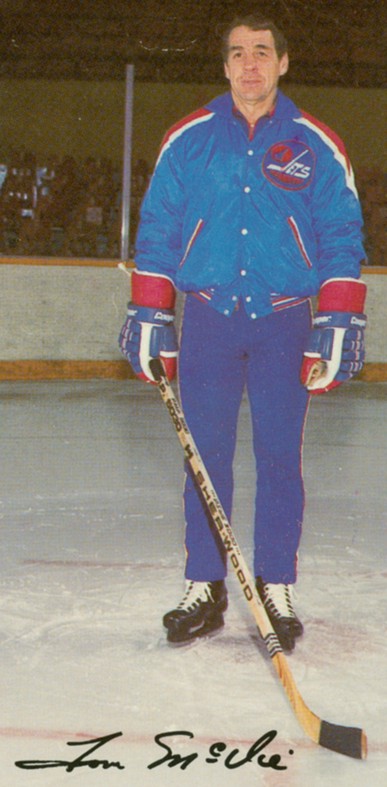Tom McVie
Though his time with the Jets was short, Tom McVie was one of the most legendary figures in team history.

He first came to Winnipeg in 1979 after being summoned by John Ferguson to take charge of a floundering team riddled with dissension. On paper, the team was loaded with talent, but it was still very much divided after the Jets added a number of players from the defunct Houston Aeros over the summer. The bitter rivals just couldn’t mesh as a cohesive unit.
A no-nonsense, hard-nosed taskmaster and disciplinarian, McVie took over and changed all that. He brought the team together and they rallied to claim third place in the WHA, then promptly went on to sweep Quebec in the first round before dispatching first-place Edmonton, led by their star rookie Wayne Gretzky, to claim the last AVCO Cup.
Little could McVie have known, however, that his toughest job still lay ahead of him.
Upon joining the NHL, the Jets were stripped of most of their players, leaving him with a roster of mostly castoffs and rejects. It wasn’t pretty. But, ever the character, McVie made things interesting.
Few saw it, but during an early-season brawl in Atlanta, McVie took out his teeth and tried to scale the glass to get at Flames coach Al MacNeil. This earned McVie a three-game suspension, which explains the reason why there’s only 77 games on his coaching record for that season.
Then came December 15, the Jets’ first appearance on Hockey Night in Canada. The defending Stanley Cup champion Montreal Canadiens were in town. The Jets put on a Tuxedo Night promotion to show the country that Winnipeggers had class. The newly expanded Winnipeg Arena was packed to the rafters.
The Jets also had their star winger back. After leaving the team early in the previous season, Bobby Hull, whose signing at Portage and Main in 1972 gave the upstart WHA instant credibility, had recently returned and despite his age, was returning to form. Though still a part-owner of the Jets, he had originally wanted to return to Chicago, but the two teams couldn’t work out a deal. Chicago didn’t feel they should have to give up anything of value for the player who they still felt was rightly theirs and Ferguson wasn’t going to budge. Which left Hull only one option – return to Winnipeg.
Being on national television, the game was scheduled to start one hour early. Hull had forgotten and his teammates were already getting dressed when Morris Lukowich noticed that Hull wasn’t there. Lukowich got on the phone and called his teammate, who said he’d be right there.
But when Hull showed up, McVie said he wouldn’t be playing. McVie had a rule. You had to be at the rink on time or you weren’t playing. Didn’t matter who you were. Last season, McVie had sat his starting goaltender, Gary Smith, because he had missed practice.
When Hull returned home, he called Ferguson in the dressing room. This is how the conversation went from Ferguson’s end:
“I can’t fire the coach.”
“Hey, Bobby, I want you to stay.”
“If that’s the way it has to be, that’s the way it has to be.”
Hull would never play for the Jets again. Months later, he would be traded to Hartford, where he would finish his career alongside Gordie Howe.
The Jets, however, hardly missed Hull that night and went on to spank their guests to the tune of 6-2. “We were so full of piss and vinegar that night,” said Lukowich, who McVie assigned the task of checking Guy Lafleur.
There was little else to cheer about that season, but in the end, getting 20 wins out of that group might have been the greatest coaching job of all time, as McVie himself often said.
But sadly, the growing pains of expansion would catch up to McVie early the next season. With the Jets mired in an epic winless streak, Ferguson had little choice but to fire his friend, leaving the duo of Bill Sutherland and Mike Smith to finish out the season.
Still, one of the game’s great characters had left an everlasting impact on the Jets.
McVie passed away in January 2025 at the age of 89.